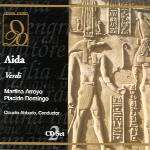Every so often a recording with known singers and conductor comes along and throws us a fabulous curve ball by giving so much that it seems as if the work were brand new and the performers were really trying to put it across. This is such a performance. In the early 1970s Claudio Abbado was a stupendous Verdi conductor, and here, with La Scala on tour in Munich in l972, he leads a fiery performance with a fabulous cast, all at their best. Martina Arroyo was a fine singer with some low-register weakness, but Aida was her best role and she’s fabulous here, singing with conviction, power, and as full a top-to-bottom register as she could muster. Fiorenza Cossotto lets her vicious, dramatic sound flow like lava as Amneris–a thrilling performance. Placido Domingo has recorded Radames four times commercially and the performances go from really good to tired. This one outshines them all, with all the notes in place and a commitment he occasionally has been known to leave home. Piero Cappuccilli, never a subtle artist, nontheless gives us an Amonasro to fear and respect, and Nicolai Ghiaurov is, as always, the perfect low-voice-in-the-ensembles. The Scala forces are terrific. Dare I say it? This is the best-performed Aida on the market, and the sound is perfectly acceptable. [4/27/2000]
































